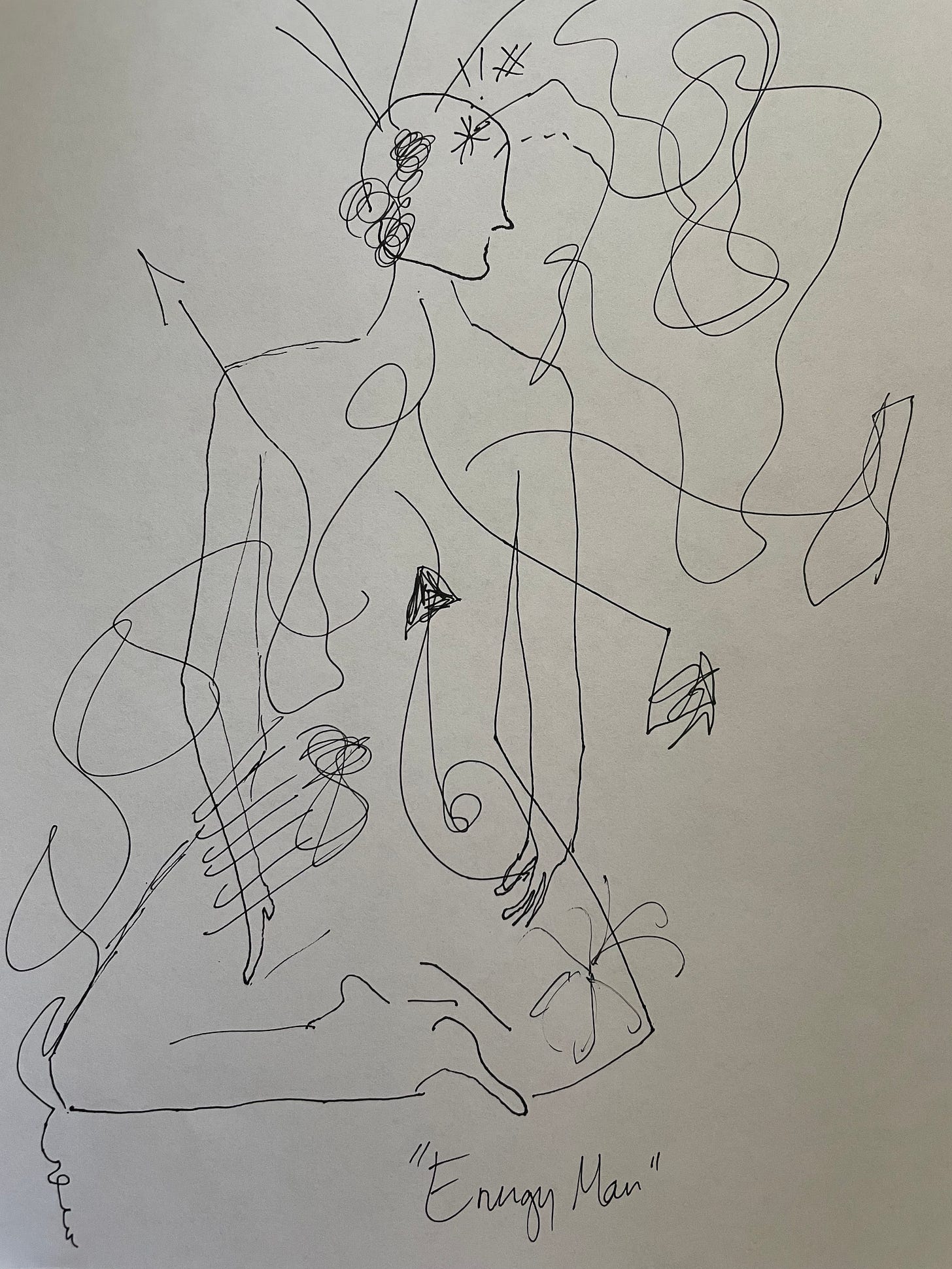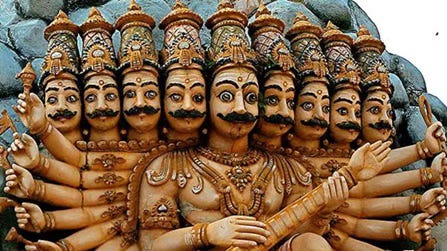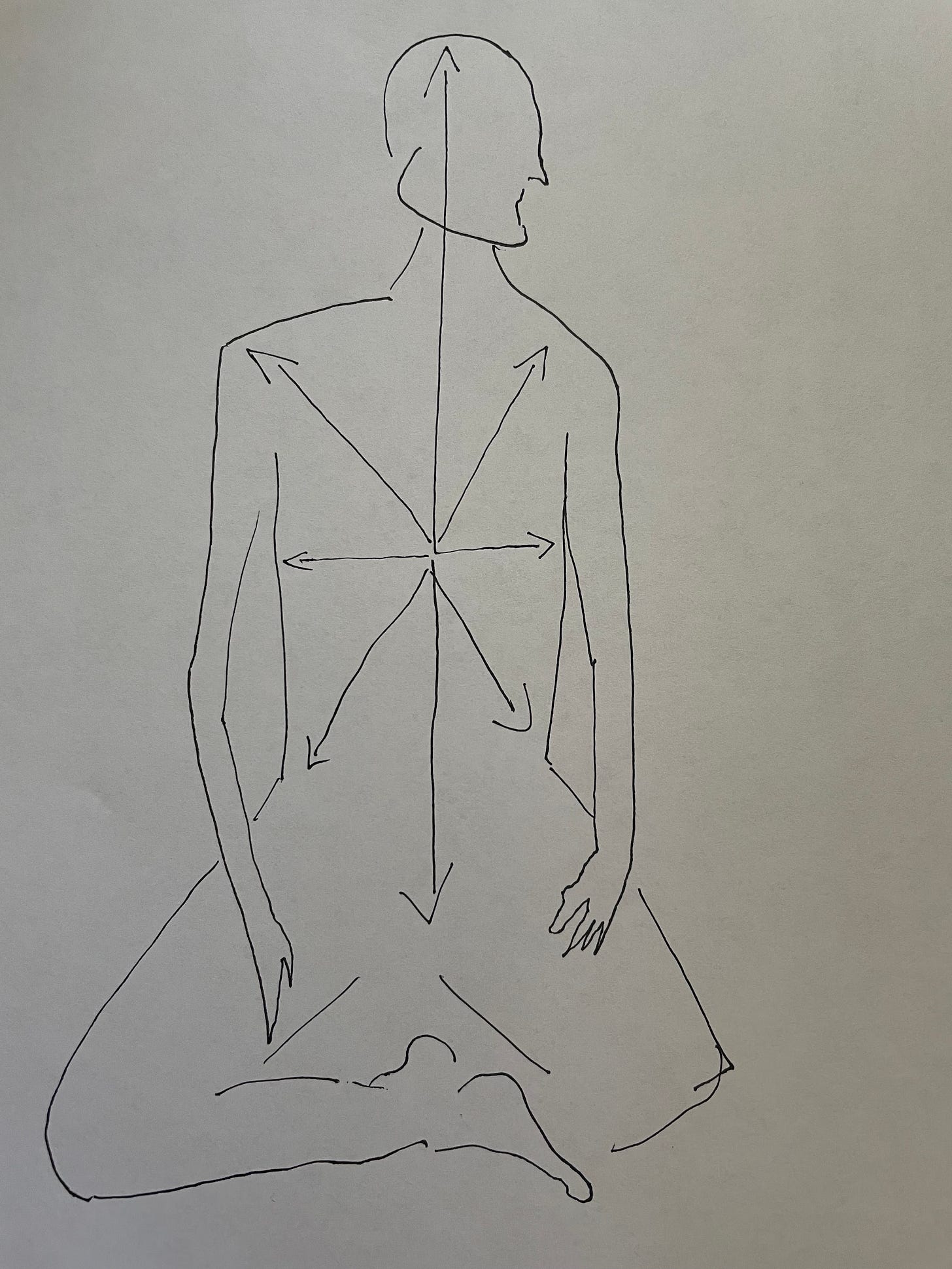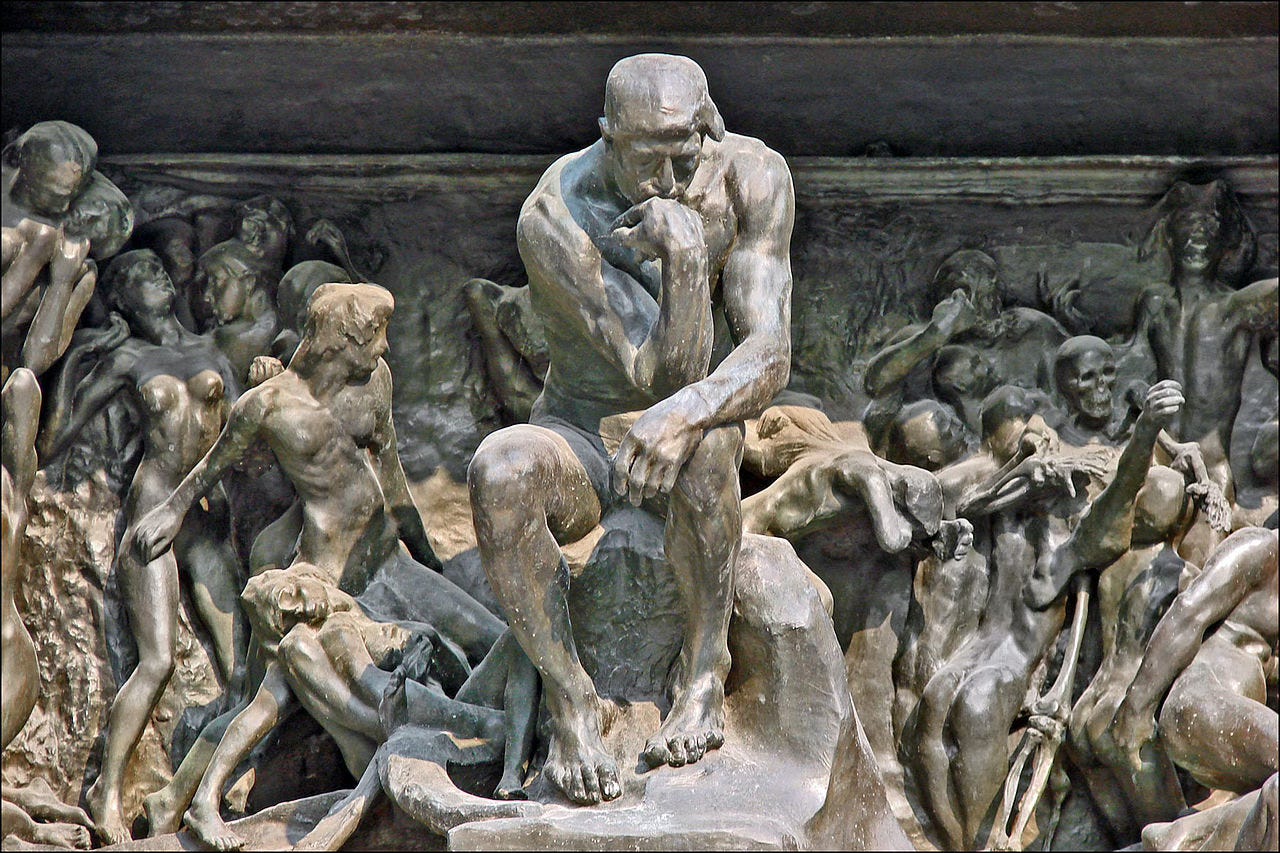“ἐφ' ἡμῖν, οὐκ ἐφ' ἡμῖν” (What is up to us; what is not up to us.) Epictetus
“Μηκέτι τοίνυν φιλοσοφεί περὶ τοῦ ἀγαθοῦ ἀνδρός, ἀλλὰ γίνου.” (Waste no more time arguing what a good man should be. Be one. ) Aurelius
Last week Substack told me I was #64 rising in Faith and Spirituality.
My mind sputtered itself to a contrariness. This is what my mind does: it sputters. Since minds are not free floating black boxes, my body subsequently tenses, snarls, flushes, farts, and makes fists.
This is what it’s like: first, how did I get on such a list? There’s a list? And I’m on this list?
Ego right quick next: 64?! I’m only number SIXTY-fucking FOUR?!
The voice of reasonableness next: well, to be 64 in a world of billions, of literally unending click baits and self propagating opinions, is quite a thing. I’ve risen. Like cream. Somebody noticed something.
The cynic: nobody noticed shit. You are writing into a void and you will always be writing into a void. Realistically, only one or two people ever click the little heart on your essays. Those people probably didn’t even read it; they probably just felt sorry for you. Probably, the automated something or other just reflected you back to yourself. It’s lying. It’s fake.
Snark: how does one rank faith? Is spirituality some kinda popularity contest?
Weary traveler: yes, spirituality has become a popularity context.
The hanger on for dear life: quick! Write something faithy! Spirited! Immediately! Perform a miracle! Write a holy book!
The Gen X-er: I don’t need them. They can do whatever. I’m over here playing with fire.
The socialized femme: oh! people need care? Here is my body, given for you; take it and eat.
The flip side of socialized femme: do you love me? Am I sexy?
The pinch of socialized femme, aka Riot Grrrl: fuck you man boy.
The radicalized femme: how dare you with the hopes and the prayers? I’m trying to talk about actual people over here. This is poLITical!
The disgruntled trying to quit The Yoga Industry writer: goddamn it, I don’t want to write about yoga anymore… (In my subliminal, which is partially brainwashing and partly grace, which doesn’t often get its own voice with actual words but I can feel inside me like a tide, I sense all my teachers are laughing at me).
The poet: rising! lift, hoist, climb, affirm; ascension; support, uplift and transcend; to increase and improve, expand to a loftiness; to value, augment, surge and aspire; promote; to swell; to enlarge; to grow and proceed. To dignify. Mayhaps to fly. I know an old woman who swallowed…
The philosopher, the scientist, and the anthropologist all huddle together like a bad joke walking into a bar. They’re wiggling their fingers and clearing their throats. They’ve got lots of winks and signifcant nods. They haw. They ahem. They whip out their notebooks and unsheathe their pens.
The soul: laughs. She just laughs.
This wasn’t getting me anywhere, so I decided to bake a cake.



The process of yoga is first finding a quietness, a neutral observation point. Krishnamacharya said a mature person is somebody who can respond to any scenario with the appropriate emotion, but come back to śāntiḥ (equanimity, serenity; śāntiḥ is not exactly balance and not exactly peace, not exactly ‘acceptance’ or yet ‘detachment’. Śāntiḥ is mostly just is-ness. But in a rising, gilded, not-how-it-was-ness). For most of us, the experience of there being something in us that is okay, or still, or quiet, is nothing short of extraordinary. It’s so extraordinary we think that’s the whole point. It’s so extra special and elusive that marketing tends to focus on it. But śāntiḥ is only half: the other half is feeling everything. There are both specific practices to facilitate feeling everything and knowing śāntiḥ, and an emphasis on the dailiness of it, the all the time nature of it, the do your best and learn how to clean up after yourself quality of it. Be present. Then do the next right thing.
The outcome of yoga is a special kind of wisdom. I like to say dharma. This is terribly important because folks would think - and a lot of the shit teaching tends to be - that the goal of yoga is peace. Or salvation. Or heaven. Or enlightenment. Or liberation. Which are all fine words to use if we have distilled and rethought them, but wrong to start with. The use of such words tends to tell me a lot about the person saying them. But the goal is neither śāntiḥ nor samādhi (usually translated to ‘bliss’ resultant from meditation). Those things are tools, not prizes. The goal is applied wisdom. One of my teachers says ‘a noble life’. Another says ‘an aesthetic life’. I guess Dharma is being able to enter the fray and leave the world a little better than you found it.
At first the outcome is an easier life and greater self acceptance. That unfolds, if you keep going, to little glimmers of spiritual something or other. One gets a sense of meaning everywhere. You start to feel grateful, inspired, and able. There are occasional miracles and ordinary sanctity. You get to know the voices a little better, and you realize they’ve each got a wisdom to them. Now you have a chorus inside, rather than a mosh pit. It’s nice. And at this point you realize that one of those inner voices is a different kind of voice: it’s unique. It’s just other. It feels different. I personally almost never experience it as an actual voice, although many people do. Different texts and lineages describe it in different ways, but I like to remind folks it isn’t in a text: it’s in your head. It’s in your body. It is your heart. You already know what I mean, you just aren’t sure you like or can trust it. You aren’t sure you can trust me. You aren’t sure you can trust yourself for that matter.
Next stage of yogic outcome is letting that part step up. Trusting that part to guide, choose, and act. It isn’t that the choir has disappeared, but now they’ve become a supporting cast. They are trusted advisors you can check in with, resources with good ideas and resilience to their credit.
Next stage of outcome is awareness of this part related to your thumping heart as a constant. Now, a lot of peace or stillness needed to be applied along the way. There have been decided moments of meditative altered states, which might have freaked you out and might have felt good. They were part of the process but they aren’t the point. Remember: wisdom, self realization, the Vision, Dharma is the goal. I’m not saying I’m there. I’m saying this is what it is and what I trust and what is said.
Dharma is the idea that every single person has a role to play. Play it well, and you feel purpose and meaning in your life. You’re also helping others. Do it right, and your actions hook into something eternal.
Miss dharma, and you’re suddenly feeling confused about what you should do and what things mean. Because of that fucking riot in your head.
“You already know what to do,” my teachers tell me. Marcus Aurelius said it like this: “Waste no more time arguing what a good man should be. Be one.” Aurelius didn’t intend this to be a teaching; his Meditations were to himself.
It may be that all philosophy comes down to this: bloom where you are planted, do what you can; save one starfish. The philosopher Epictetus said wisdom is knowing ‘what is up to us, what is not up to us’. It’s the Serenity Prayer’s ‘god grant me, I’ll do what I can.’ Et cetera.
Which, slow then suddenly, turns practical philosophy into spirituality.

During the pandemic lockdown, several constitutional scholars took up a project of reading classical texts before dawn. We all had our pandemic projects; some folks baked bread and these fellows decided to read the Bible, and Seneca, and the Bhagavad Gita first thing every day. They were trying out what the founding fathers had done. They did it just to see what would happen. After a few weeks, they suddenly started writing sonnets.
And! They continued to be constitutional scholars. They kept doing their important work even as the country faced a truly weird and uncertain time.
The cracked soulful part of me laughs. She’s not laughing like some Buddhist over a koan but like somebody whose wits have finally given way. Maybe these aren’t mutually exclusive. Maybe it’s sad but true. Maybe it’s ugly beautiful, or gritty love.
Most of the time my chorus is a pretty slick harmony, but it tends to get a lot louder and pulls some really mean punches when life is especially hard. When I’m tired or overstrained it becomes chaotic. As it gets louder and more chaotic, the processes of real life fade into the background. I get confused.
I don’t want that to happen, so I’m baking a Basque cheesecake.
This is a messy cake. It’s rough and ready. It’s a made-do goodness of modern vintage (1990s) coming out of a little family run place named La Viña in San Sebastián, Spain. The recipe is relatable: you make it with ordinary blocks of Philadelphia cream cheese and use simple methods only a fool could mess up. This ease and empathy launched the cake to fame the minute food hit the internet. The contrasts - visually, technically, in taste and in texture - give so much more than they take. It is the resolution of opposites: simple elegance, easy richness, and ugly beautiful. That capacity for resolution lends surprise and a deep satisfaction, a kind of contentment within the terrible world. Meanwhile in San Sebastián, they still sling it across the bar to customers in its crumpled and singed parchment paper. They’re doing this today, while American legislators are assassinated in their homes and other legislators crack jokes about it.
A Basque cheesecake is burned, bronzed, and burnished. It is crustless, custardy, and caramelized. The faint bitterness of the burnt crown augments the subtle sweetness of the center, which happens to be silky, almost liquid, nothing like an Italian ricotta cheesecake or that stuff you get in New York delis (I sometimes miss Junior’s. But this is different.)
You don’t need a crust; you crumple up some parchment paper to make it lay kinda sorta flat inside the pan. I find crumpling paper enormously good for frustrated feelings. And you bake the thing at a super high temp, don’t have to baby it with a water bath like other cheesecakes: it’s fast, pretty cool in that scorch is the point bit, and it doesn’t have to be pretty. A Basque cheesecake is sympathetic. It meets you where you’re at. It collapses and cracks as it cools, and that’s alright.
It’s more than alright. It’s perfect.
Ralph Waldo Emerson said “The hand can never execute anything higher than the heart can imagine.” Which is what I’m trying to say: the only possible good we can contribute invokes the hands. The capacity of the hand depends upon the qualities of the heart.
People argue all the time now about whether yoga is political or not. I think that’s a dumb argument to have; it belies a confusion about terms. Yoga is you. Sometimes you’re political but sometimes you’re not. Some people are more political than other people, by nature or necessity. All people have both this inner chaos and this quiet inner dignity, and the world is awfully loud: therefore our actions matter more than our arguments.
You know what to do.




